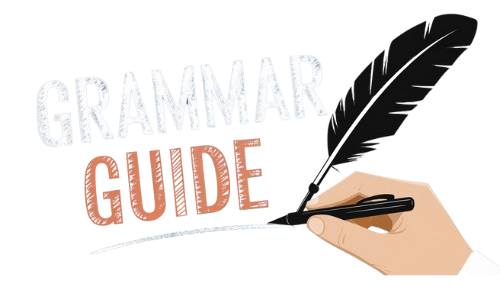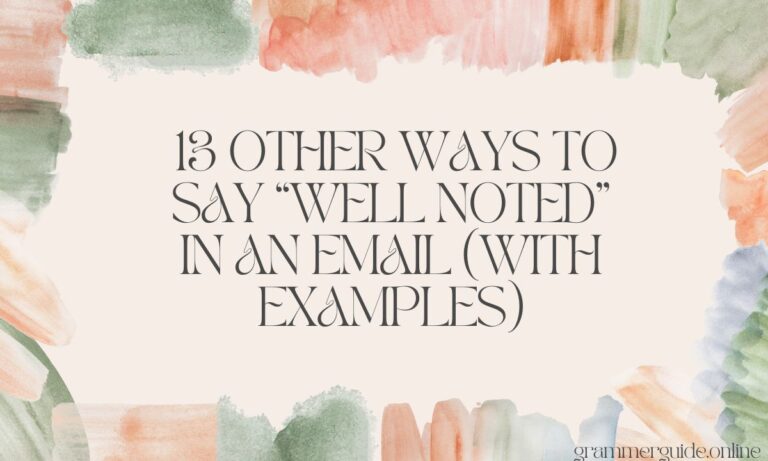Here’s a quick way to acknowledge information in an email: “Acknowledged,” “I’ve noted this,” “Thank you for the update,” “Got it, thanks,” “I will address this,” “Thanks for the heads-up,” “I’ve recorded your details,” “Understood, I’ll act accordingly,” “Received and will proceed as necessary,” and “This is duly noted.” These alternatives help keep your responses professional and fresh.
What To Say Instead of “Well Noted” in an Email
When writing emails, it’s essential to acknowledge the information properly. Rather than sticking to the standard “Well noted,” you can use other phrases that express the same sentiment but with variety. Here are some alternatives that convey the message clearly while adding variety to your communication.
Acknowledged
The word “Acknowledged” is a straightforward and professional way to confirm receipt of information. This response is clear and to the point.
You can use it in formal or professional contexts, ensuring that the recipient understands their message has been received.
Example:
Subject: Monthly Sales Figures
Dear Jenna,
Acknowledged. Great job exceeding this month’s targets. Your hard work is truly making a difference.
Best, Mark
I’ve Taken Note of This
This phrase adds a slight touch of thoughtfulness to your acknowledgment. It implies that not only have you received the information, but you’ve also processed and considered it. It’s suitable for both formal and informal contexts.
Example:
Subject: Proposal Submission
Hi Liam,
I’ve taken note of this innovative approach you’ve suggested. I appreciate your creativity and initiative.
Best regards, Dr. Reynolds
Thank You for the Update
Sometimes, when someone provides you with new information, it’s helpful to acknowledge their effort. Saying “Thank you for the update” is polite and appreciative. It can be used in many situations where someone keeps you informed.
Example:
Subject: Event Planning Progress
Dear Team,
Thank you for the update on the event preparations. It’s great to see everything coming together so well. Keep up the excellent work.
Best, Andrea
Got It, Thanks!
For a more casual response, “Got it, thanks!” is a friendly and informal way to acknowledge receipt of information. This is often suitable in less formal settings or when corresponding with colleagues you’re familiar with.
Example:
Subject: Quick Reminder
Hey Zoe,
Got it, thanks! The revisions you made look great, and I really appreciate your attention to detail.
–Sam
I Will Ensure This Is Addressed
This phrase goes a step further than simply acknowledging the information. It indicates that you not only understand the matter but are also committed to taking action. It’s appropriate when you want to reassure the sender that their concerns will be handled.
Example:
Subject: Feedback on Process Improvements
Dear Carlos,
I will ensure this is addressed. Your feedback is incredibly valuable, and I appreciate your proactive approach.
Sincerely, Ellen
Thank You for Bringing This to My Attention
This phrase is a courteous way to acknowledge that someone has highlighted an important issue or topic. It shows that you appreciate the effort and care they’ve put into informing you. It’s formal, polite, and professional.
Example:
Subject: Issue Report
Dear Grace,
Thank you for bringing this to my attention. I’m impressed that you caught this before it became a bigger problem.
Best regards, Mr. Thompson
I’ve Recorded Your Details
When someone provides you with factual information, such as contact details or updates, this phrase is an excellent choice. It assures the sender that their information has been stored or noted for future reference.
Example:
Subject: Update Your Contact Information
Hi Dan,
I’ve recorded your details. Thank you for keeping everything up to date; it’s essential for smooth communication.
Best, Natalie
I Appreciate the Heads-Up
This phrase is used when someone has given you a warning or alert about a potential issue. It’s casual and expresses gratitude for their foresight in keeping you informed.
Example:
Subject: Potential Delivery Delay
Hi Marie,
I appreciate the heads-up regarding the possible delay. It helps us manage expectations better.
Thanks, George
Understood, I’ll Act Accordingly
This phrase indicates that you not only comprehend the information but also plan to take action. It’s particularly useful in business environments where you may need to demonstrate that you’re ready to follow through on a task.
Example:
Subject: Suggested Changes to the Protocol
Dear Team,
Understood, I’ll act accordingly. Your suggestions for improving our protocol are excellent, and I’m excited to implement them.
Best, Dr. Hart
Received and Will Proceed as Necessary
This phrase confirms that you have received the information and will take the necessary steps as required. It’s a concise and professional way to show that you’re ready to take action if needed.
Example:
Subject: Client Feedback
Dear Sarah,
Received and will proceed as necessary. Your handling of the client feedback has been fantastic, and I’m grateful for your professionalism.
Best, Mr. Jenkins
Noted with Thanks
This phrase adds a slight formality to the simple act of acknowledging information. It’s polite and professional, and it can be used in formal and informal settings.
Example:
Subject: Marketing Strategy Review
Dear Team,
Noted with thanks. I appreciate your input, and we’ll implement the changes you suggested.
Best, Angela
This Is Duly Noted
This phrase is slightly more formal than other options. It is best used in professional emails, especially when you want to acknowledge that something has been officially recorded or recognized.
Example:
Subject: Legal Document Submission
Dear Mr. Turner,
This is duly noted. I’ll ensure the document is processed as soon as possible.
Regards, Grace
I’ll Make Sure This Is Taken Care Of
When you want to convey a sense of responsibility and action, this phrase is ideal. It assures the sender that their message has been received and that you’re committed to resolving the matter.
Example:
Subject: Employee Benefit Query
Dear John,
I’ll make sure this is taken care of. I’ll get back to you with the details shortly.
Best, Lisa
Frequently Asked Questions
Why is it important to avoid overusing “Well noted” in emails?
Overusing “Well noted” can make your communication feel repetitive and disengaged. Using a variety of phrases helps maintain the reader’s interest and shows thoughtfulness in your responses.
Can I use informal phrases like “Got it, thanks!” in professional emails?
Yes, you can, but it depends on the formality of the situation and your relationship with the recipient. In more relaxed environments, informal phrases can work well.
Can I use these alternatives to “Well noted” in formal emails?
Yes, phrases like “Acknowledged” or “Thank you for the update” are perfectly suitable for formal emails. They maintain professionalism while offering more variety.
How do I decide which phrase to use in an email?
Consider the context and tone of the email. If you’re in a formal situation, opt for more professional phrases like “Acknowledged.” For casual communication, phrases like “Got it, thanks!” are ideal.
Should I always include an acknowledgment when replying to emails?
Yes, acknowledging receipt of important information is a good practice. It reassures the sender that their message has been received and helps maintain clear communication.
Conclusion
Choosing the right words in email communication is crucial for maintaining professionalism and engagement. Instead of repeatedly using “Well noted,” consider using the various alternatives we’ve discussed.
Each option provides an opportunity to keep your emails fresh, thoughtful, and tailored to the context. Whether you’re in a formal or casual setting, these alternatives will help you convey acknowledgment clearly and respectfully. So, next time you respond to an email, remember to mix it up for better, more dynamic communication.
shoaib is a skilled writer specializing in grammar-related blogs. With a passion for language, he simplifies complex grammar rules, helping readers improve their writing and communication skills.







